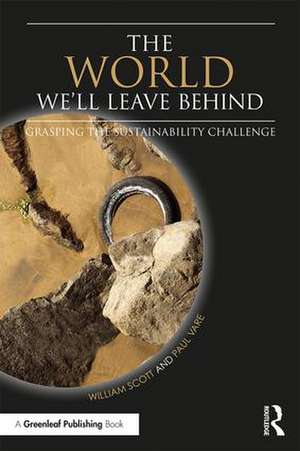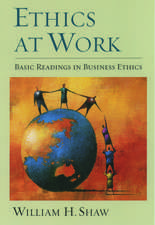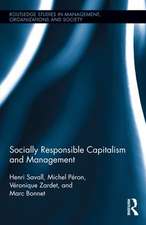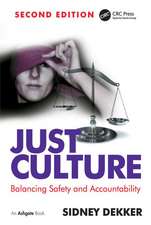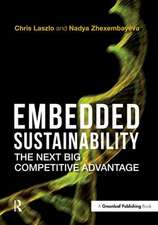The World We'll Leave Behind: Grasping the Sustainability Challenge
Autor William Scott, Paul Vareen Limba Engleză Paperback – 5 feb 2018
This book identifies the main issues and challenges we now face; it explains the ideas that underpin them and their interconnection, and discusses a range of strategies through which they might be addressed and possibly resolved. These cover things that governments might do, what businesses and large organisations can contribute, and the scope for individuals, families and communities to get involved. This book is for everyone who cares about such challenges, and wants to know more about them.
| Toate formatele și edițiile | Preț | Express |
|---|---|---|
| Paperback (1) | 353.36 lei 6-8 săpt. | |
| Taylor & Francis – 5 feb 2018 | 353.36 lei 6-8 săpt. | |
| Hardback (1) | 1000.27 lei 6-8 săpt. | |
| Taylor & Francis – 5 feb 2018 | 1000.27 lei 6-8 săpt. |
Preț: 353.36 lei
Nou
Puncte Express: 530
Preț estimativ în valută:
67.64€ • 73.49$ • 56.85£
67.64€ • 73.49$ • 56.85£
Carte tipărită la comandă
Livrare economică 21 aprilie-05 mai
Preluare comenzi: 021 569.72.76
Specificații
ISBN-13: 9781783537730
ISBN-10: 1783537736
Pagini: 254
Ilustrații: 16 Tables, black and white; 7 Line drawings, black and white
Dimensiuni: 156 x 234 x 17 mm
Greutate: 0.38 kg
Ediția:1
Editura: Taylor & Francis
Colecția Routledge
Locul publicării:Oxford, United Kingdom
ISBN-10: 1783537736
Pagini: 254
Ilustrații: 16 Tables, black and white; 7 Line drawings, black and white
Dimensiuni: 156 x 234 x 17 mm
Greutate: 0.38 kg
Ediția:1
Editura: Taylor & Francis
Colecția Routledge
Locul publicării:Oxford, United Kingdom
Public țintă
Postgraduate and Professional Practice & DevelopmentCuprins
List of figures
List of tables
Introduction
Section 1: Issues
1. Global warming and climate change
2. Inequality
3. Species loss
4. Human population
5. Acidifying the oceans
6. Electricity generation
7. Genetic modification
8. Clean water for all
9. Gender disparity
10. Natural resource depletion
11. Migration
12. Air pollution
13. Elephants, rhinos and donkeys
14. Environmental justice
15. Economic growth
16. Water pollution
17. Eating meat
18. Weather and climate
19. Ozone and CFCs
20. Biocentrism
Section 2: Concepts
21. The Anthropocene
22. Nature
23. Gaia
24. Biodiversity
25. Conservation
26. Charismatic megafauna
27. The greenhouse effect
28. Valuing the environment
29. Sustainable development
30. Development
31. The four capitals
32. Harmony
33. Systems and systems thinking
34. Frames and framing
35. Resilience
36. Complexity
37. Globalisation
38. Neoliberalism
Section 3: Strategies
39. Reducing global inequalities
40. The Copenhagen Consensus
41. Feeding 10 billion
42. Living within limits
43. Energy policy
44. Carbon capture and storage
45. Ecological footprints and handprints
46. The circular economy
47. The Earth Charter
48. Brexit and environmental law
49. Protected areas
50. Recycling
51. Transition towns
52. Rewilding
53. Biomimicry
54. (Environmental) education
55. The Montreal Protocol
Index
List of tables
Introduction
Section 1: Issues
1. Global warming and climate change
2. Inequality
3. Species loss
4. Human population
5. Acidifying the oceans
6. Electricity generation
7. Genetic modification
8. Clean water for all
9. Gender disparity
10. Natural resource depletion
11. Migration
12. Air pollution
13. Elephants, rhinos and donkeys
14. Environmental justice
15. Economic growth
16. Water pollution
17. Eating meat
18. Weather and climate
19. Ozone and CFCs
20. Biocentrism
Section 2: Concepts
21. The Anthropocene
22. Nature
23. Gaia
24. Biodiversity
25. Conservation
26. Charismatic megafauna
27. The greenhouse effect
28. Valuing the environment
29. Sustainable development
30. Development
31. The four capitals
32. Harmony
33. Systems and systems thinking
34. Frames and framing
35. Resilience
36. Complexity
37. Globalisation
38. Neoliberalism
Section 3: Strategies
39. Reducing global inequalities
40. The Copenhagen Consensus
41. Feeding 10 billion
42. Living within limits
43. Energy policy
44. Carbon capture and storage
45. Ecological footprints and handprints
46. The circular economy
47. The Earth Charter
48. Brexit and environmental law
49. Protected areas
50. Recycling
51. Transition towns
52. Rewilding
53. Biomimicry
54. (Environmental) education
55. The Montreal Protocol
Index
Recenzii
"What a wonderfully readable cornucopia of information and ideas – an inspiring and practical source for confidently talking about and acting on behalf of a sustainable future!"
-Sara Parkin, The Sustainability Literacy Project
"This is a lucid collection of short chapters on some of the world’s most intractable issues like globalisation, climate change, human population and migration. It is a unique and prescient contribution that helps make sense of an increasingly unpredictable and unsustainable world."
-Professor Stephen Martin, Honorary Professor University of Worcester and Visiting Professor in Learning for Sustainability, University of the West of England, UK
"These informed authors help readers understand vital issues about sustainability and how we live today. Importantly, they set out a range of strategies whereby everyone who's interested can play a role in keeping our planet living for generations to come."
- Per Sund, Associate Professor, Stockholm University and Research Fellow, Rose Project, Karlstad University
"I loved this book. The authors have written short but informative, provocative, and amazingly readable chapters on a wide range of issues, concepts and strategies that help us think about how we might create a more sustainable and just future. The format is brilliant!"
- Judy Braus, Executive Director, North American Association for Environmental Education
"Scott and Vare have written a very clear, accessible introduction to the sustainability idea and some of its difficulties – an excellent book for people coming new to the topic, and one from which everyone can gain new insights."
– John Foster, Lancaster University UK
-Sara Parkin, The Sustainability Literacy Project
"This is a lucid collection of short chapters on some of the world’s most intractable issues like globalisation, climate change, human population and migration. It is a unique and prescient contribution that helps make sense of an increasingly unpredictable and unsustainable world."
-Professor Stephen Martin, Honorary Professor University of Worcester and Visiting Professor in Learning for Sustainability, University of the West of England, UK
"These informed authors help readers understand vital issues about sustainability and how we live today. Importantly, they set out a range of strategies whereby everyone who's interested can play a role in keeping our planet living for generations to come."
- Per Sund, Associate Professor, Stockholm University and Research Fellow, Rose Project, Karlstad University
"I loved this book. The authors have written short but informative, provocative, and amazingly readable chapters on a wide range of issues, concepts and strategies that help us think about how we might create a more sustainable and just future. The format is brilliant!"
- Judy Braus, Executive Director, North American Association for Environmental Education
"Scott and Vare have written a very clear, accessible introduction to the sustainability idea and some of its difficulties – an excellent book for people coming new to the topic, and one from which everyone can gain new insights."
– John Foster, Lancaster University UK
Descriere
The core dilemma of our time is: How can we all live well, now and in the future, without compromising the ability of the planet to enable us all to live well?
This book identifies the connected environmental and social problems we now face; their causes, their connections and the potential resolutions. This book is for everyone who cares about such challenges, and wants to know more about them.
This book identifies the connected environmental and social problems we now face; their causes, their connections and the potential resolutions. This book is for everyone who cares about such challenges, and wants to know more about them.
